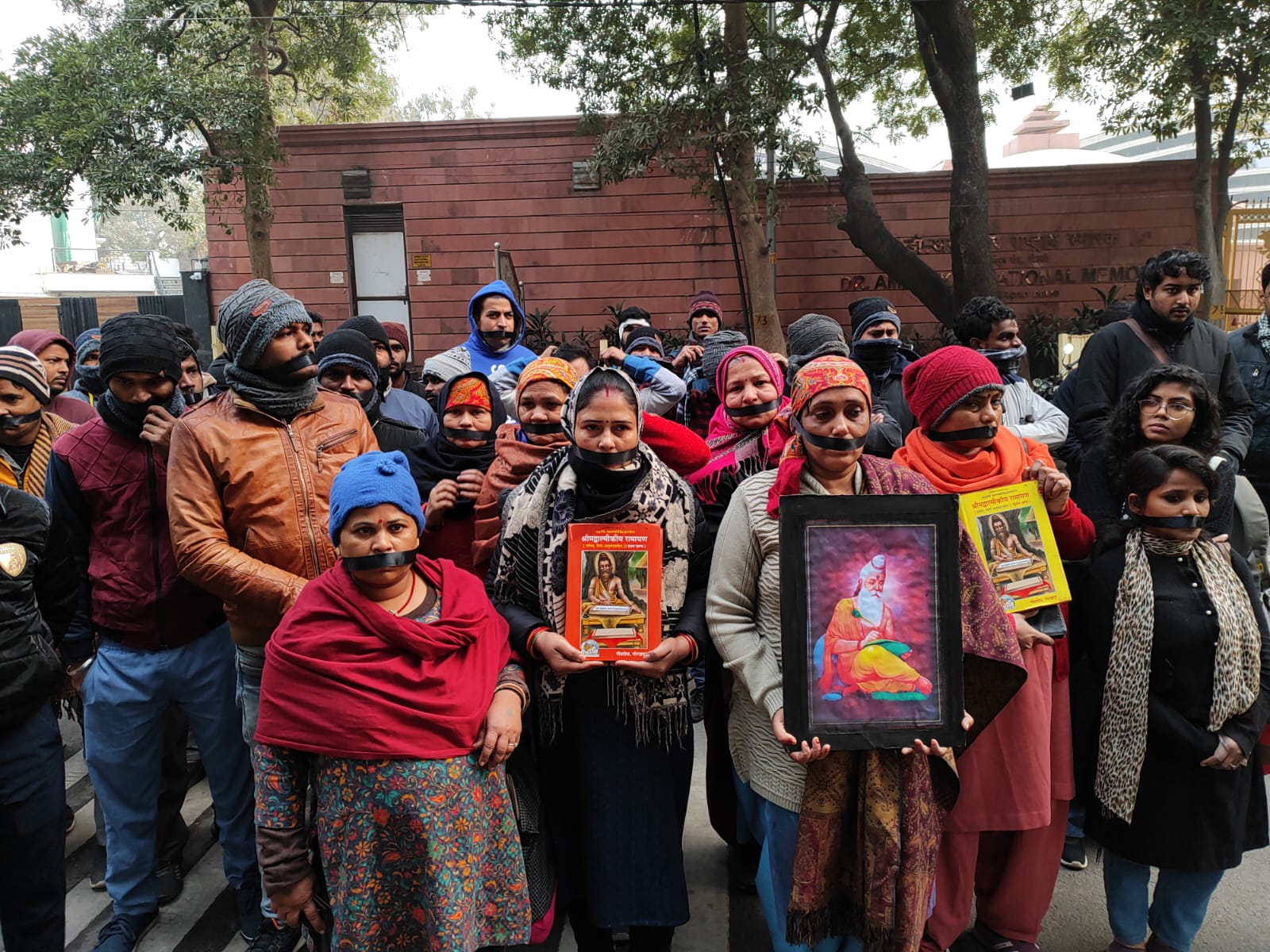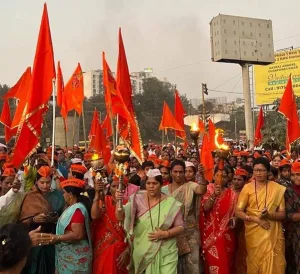Bribes, Bullying, Sexual Harassment: Why Workers In A Delhi Hospital Want An End To Outsourced Hiring
Striking sanitation workers in Delhi’s Burari Hospital have accused private hiring companies of corrupt practices and sexual harassment

Sanitation workers at a north Delhi government hospital who have been protesting against the allegedly exploitative and corrupt practices of the contract firm that hired them were forcibly removed by the police from the premises on Wednesday. The workers at the 768-bed Burari Hospital have been on an indefinite strike since January 16 demanding better work and wage conditions.
Around 200 striking workers, at least 80 of them Dalit women, have made multiple allegations against Global Ventures, the company which has been tasked with recruiting and maintaining the sanitation staff at the hospital. These charges include not paying the workers their full monthly wages, demanding bribes for jobs and preferred shifts at the hospital, and sexual harassment of women workers.
The striking workers allege that they are paid much less than the mandated minimum monthly wage in Delhi for unskilled labour – Rs 17,494. And recently, three women sanitation workers filed a complaint in the Burari police station alleging that their supervisors, Neeraj Sharma and Deepak Adarsh and manager Rajkumar, sexually harassed them. An FIR has been registered against the accused under Sections 323, 354, and 34 of the Indian Penal Code. Suspended from the hospital, they are currently on bail.
Speaking to BehanBox, the workers said they want Global Ventures, which describes itself as an “integrated facility and IT management company”, to be replaced by a public sector recruitment company.
The workers, and two supervisors, Sangita Devi and Ambalika, allege that they had to pay anything between Rs 15,000 to Rs 40,000 to the hiring firm to secure their jobs. Such firms are normally paid by employers, in this case the Burari Hospital, and are not supposed to charge the workers. The hospital earlier tasked one Kartikay Enterprises with this task and then too, the workers allege, they had been asked for bribes for jobs.
Babli, 39, a sanitation worker at the hospital, alleges that when she started she had paid Kartikay Enterprises Rs 15,000 and then again to Global Ventures, when she was rehired. (If a new contractor is hired, the staff are recruited afresh but per a Delhi Cabinet decision, at least 80% of the workforce must be retained.)
“With a delay in my wages, I am drowning in debt,” says Babli. Savitri Lal, (35) another sanitation worker in Burari’s Hospital alleges that her husband had to pay up similarly to both agencies and is now stuck with a debt of Rs 55,000 that has hit the family’s savings.

BehanBox reached out to Global Ventures and Kartikay Enterprises for their response to these allegations. The copy will be updated when we receive a response.
Contractualisation of work is a growing practice, wherein employers outsource essential services to external agencies on a contract basis, and it has been criticised for denying fair wages and job security to workers. It also vests a lot of power in the hands of such agencies and women have been particularly vulnerable to their exploitative practices related to pay, benefits and safety, as BehanBox has reported earlier here and here.
In Burari too, we found many stories that reflect these problems. But there are also earlier precedents.
‘We Have To Bribe Contract Companies For Jobs, Shifts’
Similar allegations were levelled by the sanitation workers of Delhi’s Kalawati Saran Children’s Hospital in May, 2023. Here too workers said they had to pay the contractors to be hired.
In 2022, 34 sanitation workers, 29 of them women, working in North Delhi Municipal Corporation, protested against the private contractors who allegedly sought Rs 10,000 to secure their jobs. Most could not pay, and were not employed.
Harish Gautam, a member of the Safai Kamgar Union, a union of sanitation workers in Delhi, says that this corrupt hiring practice is rampant in contractual work. “During Ambedkar University’s sanitation workers protest in 2019, 56 sanitation workers were terminated after the contract company changed. The new company asked them to pay Rs 25,000 in order to secure their jobs,” he says.

The workers at the Burari Hospital have four days off in a month and for the 26 workdays they are entitled to a minimum monthly wage of Rs. 17, 494, as we said before. However, many allege that they are paid less – under Kartikay, it was Rs 15,800, and under Global Ventures, Rs 13,000. They are not paid bonuses, they say, despite the Payment of Bonus Act 1965.

The workers further allege that some of their supervisors seek a “cut” of Rs 2000-3000 to let them keep their shifts. “They also give us random offs so that some of us only work 15 days out of the 26 days in a month. In the end, we earn only Rs. 10,000. How can we sustain our families with this?” says Renu Devi, 34, who belongs to an SC community.
The number of workdays allotted to workers also depends on the bribes offered to the contract company, alleges the Safai Kamgar Union that has been organising the workers for the past few months. “If we pay them Rs 40,000 then we get 20 days of duty; Rs. 15,000 for 10 or even less. In the last four years, I have never worked for the whole of 26 days,” says Chanda Devi.
The workers say they have complained to the hospital administration several times, and been on week-long strikes last year, but their complaints went unheard. “Humein ulta kehte hain, paise do warna hospital se bahar niklo (on the contrary, we are asked to pay up or be kicked out),” says Lila Devi, (45), a sanitation worker in the hospital.

“There is no action or even reaction from the government. Consider this: if a company has the hiring contract for 10 hospitals, and each hospital has 100 workers, at Rs 40,000 demanded per job from workers, the contract company makes around Rs 4 crore in one go,” says Gautam.
Women More Vulnerable
This kind of exploitation is disproportionately meted out especially to women workers, who are vulnerable, says Nandita Shivkumar, labour and gender rights activist, and has worked closely with the garment workers of Tamil Nadu.
“Contractors will hire workers who are from tribal communities in Jharkhand, Odisha and they are so impoverished that they will do anything to get a job. These contractors particularly target vulnerable women. Contractors who speak Tamil and Odia, will go to villages, spend their time finding these vulnerable women and then bringing them here. Usually they ask the workers for a one-time ‘fee’ of Rs 50,000. They take a cut from both the management and the worker,” says Shivkumar.

BehanBox spoke to Ashish Goyal, the Medical Director at the Burari Hospital, who claims that no complaints about the bribery allegations have been received by his office.
“We don’t know anything: 500 people work here. No one has issues,” says Goyal.
The strike means that the ICU has not been cleaned, say the workers. “Family members and patients are being made to empty the urine bags,” says Lila Devi. Workers from Dr Baba Saheb Ambedkar Hospital in Rohini are being asked to come and do the job on a daily wage basis, the workers report. “They too haven’t been paid their wages for the last month in their hospital,” alleges Mandvi, a member of the Safai Kamgar Union.
Exploitative Practices
On December 19, three women workers lodged a sexual harassment complaint alleging sexual assault by three of their supervisors hired by Global Ventures, two of whom were named in the July FIR.
All three accused were finally removed in December. But now the workers were allegedly being coerced to withdraw their cases by Global Ventures. “If we don’t then they will not pay our wages, the hospital administration told us, which is why we weren’t paid for the month of December,” alleges a worker on the condition of anonymity.
Amidst delays and non-payment of their wages, the workers are also alleging that they are harassed in other ways – such as being asked for a Class X certificate or being marked absent even when they come to work.

Besides this, threats of transfer and termination are routine, say workers. Renu, who has been working in the hospital since 2020, was terminated in July last year when Global Ventures was brought in. She was also among the three women who complained against sexual assault by her supervisors; she was not rehired.
In December, Lila Devi was ordered by her supervisor to be transferred to Indira Gandhi Hospital which is in Dwarka, Sector 9. She protested. Devi lives in North Delhi’s Ibrahimpur and the transfer would mean that she would have to travel for at least an hour to reach the hospital. “I don’t know where it is. I don’t even know how to read the signs on buses because I’m not literate. Why will I work there?” says Devi.
Several workers say that if they are late by even 10 minutes for the 7 am morning shift, they are asked to go back home. Savitri Lal (35), a sanitation worker in the hospital, who lives in a jhuggi in Jahangirpuri, says that for a 7 am shift she has to leave home at 5:30 am and has often been harassed by passing men at her bus stop.
The Safai Kamgar Union wrote to the Delhi health minister, Saurabh Bharadwaj, about these arbitrary terminations and transfers. He responded with a directive to Global Ventures to ensure that, “the services of [sanitation workers] are neither terminated nor are they victimised by any other means”. But this has not made a difference, says Mandvi.
On Wednesday, the minister also verbally assured the workers of an enquiry into their allegations of corruption and violation of labour laws. But the workers say they will be on strike till a written assurance is issued.
One of the demands of the workers is the provision of a written contract when they are employed, and granting them the status of permanent workers. “Currently, the workers have no proof of work which is why workers like Kumar and Renu are easily terminated,” points out Gautam.
Why Workers Are Vulnerable
The Contract Labour (Regulation and Abolition) Act, 1970 regulates the employment of contractual labourers in India and safeguards the rights of workers, contractors and the principal employer, in this case the Burari Hospital. However, the act says nothing about job retention, or what recourse do workers have in case they are arbitrarily terminated, BehanBox found.
Speaking to BehanBox about workers not being paid their due wages, Goyal asked us to take this matter up to Global Ventures directly. “Since the workers were outsourced by a contract company and not directly employed by the Hospital, we are not responsible for these matters,” he says.
However, the law says otherwise. According to the Contract Labour Act, under Section 21 (l) if the contractor fails to make payment of wages, it is the responsibility of the principal employer to make the payments in full, or the unpaid balance due.
Section 17 of the Contract Labour Act states that both the contractor and the principal employer are supposed to provide restrooms for workers who work night shifts. No such facilities exist. “To change our clothes, we look for random corners, or go to the patient’s washroom. We are not even allowed to use the washrooms that we clean. Only the permanent staff uses it,” says Lal.
Desperate Workers Are Hesitant To Protest
Babli Devi, who wakes up at 4 am, and changes three buses to reach the hospital seven days a week, says: “When doctors can be permanent, why not us? I have worked during both the pandemics. Our neighbours, even our family members didn’t accept us then. If we don’t work, then who will?”
“Labour law is known as abolition so that it abolishes contractual work eventually but that is not the case,” says Indrani Mazumdar, who teaches at Centre for Women’s Development Studies and has authored the book, Women Workers and Globalization: Emergent Contradictions in India.
In 1960, a decade before the Contract Labour Law came into force, workers of Standard Vacuum Refining Company, raised an industrial dispute with respect to the company employing contract labour cleaning and maintenance work. Demanding the abolition of the contract system in the company, the workers asked that they be made regular so they were not denied the rights and benefits they were entitled to. The Tribunal agreed, and its judgement went on to lay the foundation for the 1970 Act.
“All these institutions are permanent, and work is supposed to be done regularly like cleaning, teaching, even during holidays. Then why is this work contractual and not permanent?” says Gautam.
For those who violate the act, the penalty is a meagre “imprisonment for a term which may extend to three months, or with fine which may extend to five hundred rupees, or with both”. Also, workers are too vulnerable to fight their contractors. “The Contract Labour Act is a quite progressive Act – it stipulates how contractors should behave. It talks about the liability of contractors. The difficulty is the workers don’t fight these contractors, because this is the only way to get jobs. The precarity is being completely pushed to more vulnerable workers,” says Shivkumar.
‘We Want A PSU Recruiter’
Goyal has confirmed on call with BehanBox, that the hospital plans to let go of Global Ventures, amidst allegations of sexual harassment, and bring in a new contract company. But the workers say they are fed up with private tenders and want them gone. “Thekedaar jab jab badalta hai, utni baar shoshan hota hai (changing the contractor worsens the exploitation),” says Renu.
What they want is a government contract, similar to the case of Ambedkar University. Its sanitation workers’ movement in 2019 resulted in the replacement of private tenders with Broadcast Engineering Consultant India Limited, a public sector undertaking that provides consultancy services. “Under BACIL, the contractual workers are being paid minimum wages,” say members of the Safai Kamgar Union.
Till then, the workers say they will protest indefinitely.
Sangita Devi (45), a supervisor in the Burari Hospital who organised the 200-odd workers, says the task of organising was hard. “I have been intimidated and threatened with being terminated too,” she says. “Par hum bilkul nahi darte. Hum majboor nahi hain, mazdoor hain. Jis din mazdoor jagruk hogaya na, naukri karna hum inko sikha denge (we are not afraid, we are only asking for our rights. The day workers become aware of their rights they will be able to teach everyone how to do their jobs),” says Devi. But why did it take her four years to mobilise, we asked?
“Because this hospital was opened during COVID, most of the workers were already jobless and really desperate for jobs, so they paid whatever amount was quoted to them. But women workers who have been hired recently started raising their voices against the harassment,” says Devi. “Chaar saal se ro rahe hain. Ab aar ya paar (we have been crying for four years, now it is do or die),” says Babli.
Several patients in the hospital have also shown their solidarity to the workers, says Babli Devi. But one worker, Rajkumari, despite the protest, did help a doctor in a critical delivery case. “As a human being, it is my duty to help,” says Rajkumari.
We believe everyone deserves equal access to accurate news. Support from our readers enables us to keep our journalism open and free for everyone, all over the world.




